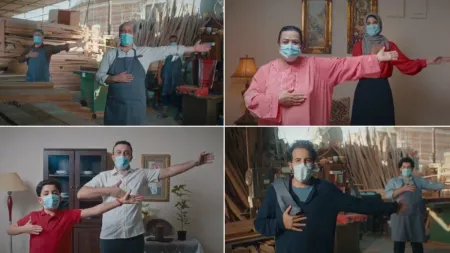You know CARE teams are up to something cool when a national TV station says we’re being innovative and surprising them with how much engagement we can drive. Not only that, program participants say, “My daughter is washing her hands and wearing a facemask all the time.”
How did we do it? Producing videos with people that represented all walks of life in Jordan, and by using our baseline to focus on people’s major concerns—especially mental health. Getting creative, adapting quickly, and being inclusive so we can feature lots of people all contributed to success. As a result, 67% of the people in the project registered for COVID-19 vaccines—saying that messages from CARE were a contributing factor in making their decisions.
From 2020 to 2021, CARE Jordan ran the project Promoting Safer Hygiene Practices for Women and Girls as part of the Hygiene and Behavior Change Communication project with $803,000 in funding from Unilever and UK Aid. The project worked with 222,000 people (111,000 of whom were women) directly, and 777,000 indirectly. Here’s what the endline evaluation told us.
What changed?
- Registration for COVID vaccines went up. 67% of people said they registered for a COVID-19 vaccine, in part because of the messages from this project.
- Mental health got better. 33% of people said they used new techniques to manage their stress and self-care because of what they learned from the project.
- People are more committed to COVID-19 prevention, and more able to act on it. 98% of people increased their commitment to COVID prevention behaviors, especially wearing a mask and washing their hands. 96% of people said it was easier for them to actually take those hygiene actions. 97% of people were more likely to wash their hands.
- People taught each other. 57% of people said they shared what they learned with others to help prevent the spread of COVID-19.
- People’s financial burdens dropped. ALL respondents said that the project helped them reduce their financial burdens in COVID-19, and 23% said that was a significant reduction in financial burdens.
- People thought the project was fair and helpful. 98% of people were satisfied with the distribution process, and 78% were satisfied with the contents of the hygiene kits they got. One participant said, “The treatment of the distribution team was amazing…they also told us information about handwashing and the proper way to wear a mask.”
- Men are starting to share unpaid care burdens. 8% of men are taking on more household chores than before.
How did it happen?
- Use lots of formats to share information. The project used games, radio, TV, face to face visits, recorded health messages called Mobile Doctorini, and social media to share health messages. One woman says, “My children love the game. They usually get into an argument on who should play next…It is so fun, I play the game with my husband once a week.”
- Use your research to focus on the most important issues. CARE’s baseline said that mental health issues were a huge concern, so the team worked with TV and radio stations to create messages about mental health and self-care.
- Work with media companies. Royaa TV—one company that publicized these messages, said this was the first time anyone tackled mental health in an awareness campaign. Nashama radio station was impressed by the way CARE developed radio and social media messages, and were pleasantly surprised at how much listeners engaged with the media by calling in and asking questions.
- Include everyone. CARE developed special messages featuring people with disabilities, men taking on traditionally women’s roles, and with photos and videos of people that showed the diversity of people living in Jordan. The TV channel said, “CARE’s advertisements were attractive, distinctive, with simple presentation with the main objective of reaching all categories of people in society.
- Adapt based on feedback. When participants said that hygiene kits included too many gloves, but not enough soap or sanitary pads, CARE changed the kits for the second round to better meet people’s needs.
- Work with local leaders. The team put together special TV interviews with officials from the Ministry of Health to promote COVID-19 vaccines when they became available partway through the project.
- Fill in technology gaps. The project paid for data bundles on phones for some project participants so they could get better access to information through the project. Without that additional support, they would not have been able to access many of the key messages from the project team.
What did we learn?
- People prefer cash. 97% of people said they would have preferred cash or vouchers to getting hygiene kits, and 79% specifically said they preferred cash. Interestingly, only 0.5% of people said they would have wanted mobile money.
- Whatsapp works, but we need to complement it with other tools. 100% of people said Whatsapp was their preferred way to receive information, and 99% said SMS/text messages would be helpful for them. In general, men were more likely to prefer Facebook as an option, and women were more likely to want to see things on TV or with visits from health centers
- Media that reaches more people doesn’t necessarily have more impact. People said they preferred Whatsapp as a communication tool. But for the 2,000 women in Azraq camp who had access to them, the Mobile Doctorini audio messages were the ones where they learned the most and felt most engaged. 77% of the women who got those messages listened to those all the way through—a huge indicator of success.
Want to learn more?
Check out the project evaluation.
